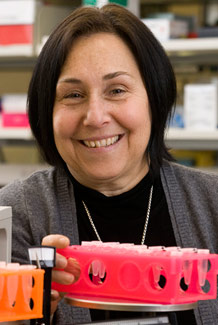Combining vast genetic data sets to fight asthma
Finding a needle in a haystack would be easy compared to determining which faulty genes and disrupted genetic building blocks influence a particular disease—especially a common one such as asthma, which affects about 300 million people worldwide and kills almost 4,000 in the United States every year.
The human genome is comprised of more than 3 billion base pairs, the basic building blocks of DNA. To ferret out the genetic underpinnings of a disease from such a vast molecular “haystack,” researchers compare the makeup of populations of people with and without the disease, looking for differences in these base pairs. The more information to look through the better, so pooling data is critical.
But coordinating the work between investigators at many institutions as well as combining and analyzing huge data sets are difficult tasks. That’s one reason the National Institutes of Health awarded $7.4 million in ARRA funding over two years, to create a consortium that will bring together all nine U.S. groups involved in genome-wide association studies on asthma. GWA studies use high-throughput technologies to evaluate over a million DNA base pairs that differ among individuals and relate them to clinical conditions and physical traits. They are a powerful tool for discovering genomic functions and elucidating disease mechanisms.
“This award will allow us to conduct our research on a much grander scale than any of the investigators could have done individually, and over a much shorter period of time than we could have done through traditional grant mechanisms,” said Carole Ober, PhD, Principal Investigator on the grant and Blum-Riese Professor of Human Genetics, Obstetrics and Gynecology, and the Committee on Genetics, Genomics, and Systems Biology at the University of Chicago.
The researchers united in this grant have data on more than 15,000 subjects including European Americans, African Americans and Hispanics from the United States, Mexico and Barbados. This will allow them to develop a data set of more than one million genetic variations suspected of causing or contributing to asthma.
The grant also will fund studies to follow up on the most promising results of this meta-analysis in a separate set of 17,000 subjects. In addition, Dan Nicolae, Associate Professor, Medicine; Statistics; and Human Genetics; and Senior Fellow, Computation Institute at the University of Chicago, will lead an analytical and computational group of scholars that will develop new analytical methods and examine complex models of asthma susceptibility that include gene-environment and gene-gene interactions. Nicolae and his fellow researchers will also develop new methods for combining data from studies with different types of designs (case-control, cohorts, families, etc.).
“I believe our combined research work will significantly impact the discovery of asthma genes and our understanding of the pathogenesis of asthma, as well as associated diseases,” Nicolae said.
One result could be a genetic screen for the risk of asthma that would allow for earlier detection or intervention of the disease. Another could be the development of individualized therapies based on a patient’s genetic makeup rather than just his or her symptoms. “We have the potential to improve public health and health care delivery,” Ober said.
by Greg Borzo
This award is funded under the American Recovery and Reinvestment Act of 2009, NIH Award number: 1RC2HL101651-01. For more information on NIH’s Recovery Act projects, visit http://recovery.nih.gov/.

University researcher Carole Ober, PhD, received one of the largest ARRA grants awarded to UChicago: $7.4 million from the NIH to study the genetic underpinnings of asthma by combining data from 30,000 subjects at 10 U.S. research institutions. (Photo by Lloyd DeGrane)










